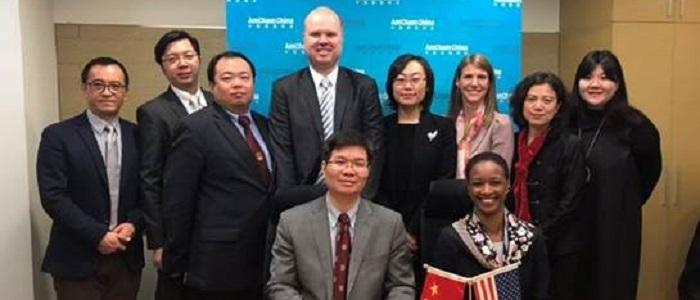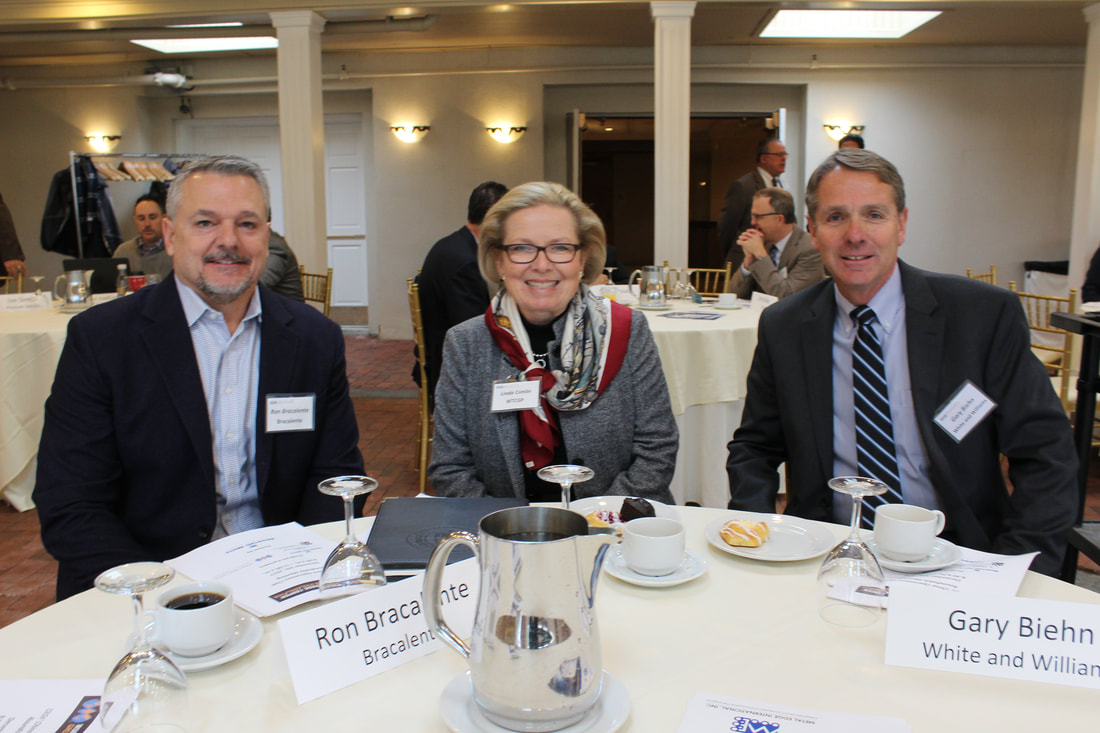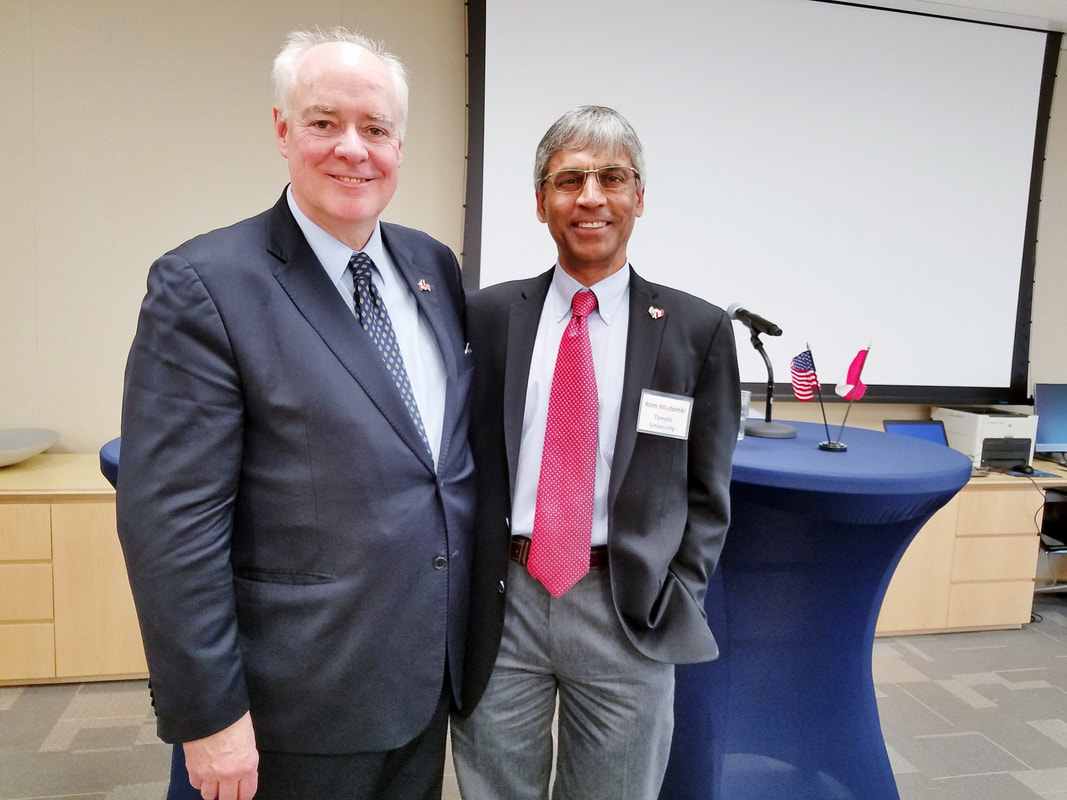|
by Joseph N. DiStefano, Philadelphia Inquirer The neighbors stopped by last week, and said it’s time we North Americans talk.
“We practically live together,” says Perrin Beatty, the industrialist who heads Canada’s Chamber of Commerce, and was the nation’s foreign minister when his Conservative Party was in power. Take that TD Bank down the road. The “T” is for Toronto, where it’s based. Suncor, Canada’s oil giant? Born in Philly, where it grew out of Sunoco. U.S.- and Canada-built cars are full of parts shipped across the Great Lakes and back. Canadians supply more stuff to U.S.-based Home Depot alone than they sell to France. And the United States sells more to Canada than it buys. “It’s an easy relationship,” said Phyllis Yaffe, the broadcast producer who runs Canada’s consulate in New York. Like Beatty, she has a sister who lives in the U.S. But that cozy relationship is in danger, the pair told me, stopping by Philly en route to Washington, for the latest round of talks renegotiating the North American Free Trade Agreement — which helped negotiate in the 1990s, and which President Trump and Democrat Hillary Clinton blamed for U.S. unemployment in last year’s bitter election. In the ensuing talks, the Trump administration has introduced many “measures that are unacceptable to the U.S. business community, let alone the Canadian and Mexican business communities,” Beatty told me. Trump’s negotiators, he said, want to block cheaper imports in hope of reviving old-fashioned home industries and reopening long-gone factories — like King George III, whose similar attempts to favor his home producers stoked our War of Independence. Canadians don’t threaten war; they hope to bring us to our senses. Beatty says Trump wants to impose tariffs that would make imports expensive for American consumers. U.S. negotiators want a “sunset clause,” making rules temporary and discouraging cross-border investment. They want to strictly measure U.S. auto parts in cars, limiting Canadian and Mexican parts. Beatty called that “wholly unworkable,” given today’s “deeply integrated and highly efficient” supply chains. The administration also wants U.S. courts, not trade-partner panels, to rule on our trade complaints, and would end Canadian sales to U.S. government agencies, driving up costs for U.S. taxpayers. The Canadians see U.S. business as an ally. On his web site, U.S. Chamber president Thomas Donahue warns of a dystopian post-NAFTA economy: “The U.S. unemployment rate is climbing. Crops in the heartland are rotting. Manufacturers are moving abroad. Consumer prices are rising.” If NAFTA goes down, the U.S. loses and China wins, Beatty said: “The North American industrial base is… facing burgeoning competition from Asia and elsewhere. We need to source affordable inputs from the U.S. and Mexico. That’s what keeps our employers in business. If you drive up the costs of production by reinstating tariffs, you will be less competitive. Trade creates economic growth. If we had to compete without you, it would drive companies out of business — ours and yours. “We wouldn’t all go away if NAFTA disappeared. But growth, and substantial numbers of jobs, would,” he said. “If you displace North American products, who fills the gaps? The Chinese.” What motivates Trump? “It’s more ideological than a case of any sector or industry lobbying,” Beatty responded. “The president ran against NAFTA. It was used as a symbol.” The real cause of change is capital investment in more efficient technology, Beatty said. That has removed many jobs in traditional sectors. “They are looking for someone to blame.” But hasn’t foreign trade wiped out many small industries? Beatty should know: His family used to manufacture farm equipment in a small town west of Toronto. Nearby towns made clothing, competing with makers in North Carolina and East Asia. Those factories are gone, but they were doomed even without a trade agreement, Beatty said, while his old Parliament district has prospered: “Small manufacturing has given way to an explosion of technology. Now those towns — Kitchener, Waterloo, Guelph — they have information economies. [The firm that made the] BlackBerry is from Waterloo. The people who ran it have spawned new start-ups. They have become much more diversified and several times larger. The transition wasn’t easy for my family. But we are now doing what is sustainable, given the natural evolutions that have taken place. We are part of the future.” Kill NAFTA and you force the Canadians and Mexicans to sweeten trade deals with China, Beatty reiterated. “It’s seductive, to want to protect your native industries. But at the end of the day it is destructive to growth. You erect walls, and it makes it more difficult for businesses to serve each other. To invest. For people to be mobile — to work in each other’s countries for short periods, as you often do, in manufacturing and in collaboration. Unfortunately, when you get simple quick fixes, they are often wrong.” Original Article Via USTDA Beijing, China – This week, USTDA Deputy Director, Enoh T. Ebong, concluded a trip to China where she advanced cooperation with the Agency’s public-private partnerships in the aviation, energy, and healthcare sectors. Deputy Director Ebong signed two grants launching two new series of workshops in support of the U.S.-China Healthcare Cooperation Program (HCP). The goal of the workshops is to support China’s efforts to improve the quality of healthcare provided to citizens, while at the same time connecting U.S. businesses to new opportunities in the sector.
In the energy sector, Deputy Director Ebong, alongside Ambassador Terry Branstad, built on the momentum of the U.S. Gas Infrastructure Exports Initiative by announcing a grant for a gas workshop series under the U.S.-China Energy Cooperation Program (ECP). The workshops will support the gas infrastructure goals of China’s National Energy Administration, while facilitating market access for U.S. LNG and gas-related equipment and service providers. Deputy Director Ebong also kicked off a new USTDA-funded Shanghai Airspace Capacity and Ground Optimization project that will introduce U.S. aviation technologies and best practices aimed at reducing flight delays. She participated in the Standing Committee Meeting with the U.S.-China Aviation Cooperation Program to continue mutually-beneficial cooperation between the U.S. and China in the aviation sector. “I appreciate the opportunity to advance our collaboration on a number of levels with USTDA’s public and private sector partners in China,” said Deputy Director Ebong. “The work under our public-private partnerships demonstrate USTDA’s win-win mission of connecting U.S. businesses to new opportunities overseas, while at the same time supporting our partners’ infrastructure development goals.” About USTDA The U.S. Trade and Development Agency helps companies create U.S. jobs through the export of U.S. goods and services for priority development projects in emerging economies. USTDA links U.S. businesses to export opportunities by funding project preparation and partnership building activities that develop sustainable infrastructure and foster economic growth in partner countries. MEDIA INQUIRIES: Allison Getty at (703) 875-4357 Original Article Via CNN Money Britain has lost 65,000 retail jobs since it voted to leave the European Union, a decline fueled by increased online competition and a Brexit-induced wage squeeze.Employment data published Wednesday show the number of jobs in the sector dipped below 5 million in September. Weak consumer spending suggests more pain to come over the holiday season.
"It reflects the pressure on the [retail] sector," said Howard Archer, an economic adviser to EY. "Consumer spending has been softer for most of this year and retail sales have been lower." Data compiled by IHS for Visa (V) show that spending in U.K. brick-and-mortar stores dropped 3.5% over the previous year in November. It was the seventh consecutive monthly decline, and one of the biggest drops since 2012. Meanwhile, online spending was 2.4% higher in November. Visa said it expects total consumer spending to decline this holiday season for the first time since 2012. Experts say the trend is one consequence of Brexit. The value of the pound dropped sharply after the vote in June 2016, causing the price of imported goods to shoot up. At the same time, wage increases haven't kept pace with inflation, which stood at 3.1% in November. Many borrowers have also been squeezed by the Bank of England, which hiked interest rates in October. Andrew Wishart, U.K. economist at Capital Economics, said retailers are still trying to hire workers, but weak pay growth has made the jobs less attractive. Related: 17 years without a raise? Welcome to Brexit Britain Overall, British unemployment is still at just 4.3%, its lowest level in decades. There have been big gains for jobs in construction and hospitality. But weakness in the retail industry underscores worries that there may be harder times ahead. Wednesday's data show the number of people in work dropped by 56,000 in the three months ended October. "The fact there [are] fewer people in work is bad news ... it shows we are not making full use of our resources," said Yael Selfin, chief economist at KPMG in the U.K. Original Article As I thought of a message for December, looking back at this year and ahead to the next, I decided to focus on our member companies. It makes sense. Our members are at the heart of what we do as a world trade center - providing the international know-how and global connections to help our companies better their bottom line by going global. We consider ourselves as trusted partners in their success. We are proud that companies we assisted reported generating over $147M in new export sales in 2017, and we understand how much this means to these companies, their employees and families, and the communities in which they play such a strong role.
But this is only half of the story. As much as we support their success, our member companies help all of us. Last week I attended a meeting of our China Club, whose members gather to be briefed on major issues and topics concerning China trade, but most importantly, to learn from one another. The two hour meeting passed quickly, with three companies from diverse industries and with different business models, sharing their stories - what worked, what didn’t, what to do and what to avoid. The conversation was candid, honest, and provided invaluable insight, gained from direct experience, to the veterans and the newcomers in the audience. I came away thinking of the generosity of our members and the wealth of information they are ready to share with their fellow members. Nationally, Commerce Department statistics indicate that over 304,000 American companies export, with 97%, or 297,343 classified as small business. The same percentages hold true in our region. It is also true that most of these small businesses lack or are unaware of the services available to help them grow exports. For this reason, we launched the Greater Philadelphia Export Plan with City and Regional leaders to increase exports in the Region, part of a national Brookings/JP Morgan Chase Global Cities Initiative. Supported by an important grant from the U.S. Economic Development Administration of the U.S. Department of Commerce, in 2018, we will be looking for those small and medium-sized businesses who are ready and eager to grow and increase their profitability in promising markets around the world. We will be seeking out established companies, but also the next great global entrepreneurs, minority and woman-owned enterprises. And, we will invite them to become part of our special learning community, where the newcomers connect with, and often partner with, veteran exporting companies. And who knows, you may become our next China Club Member! As you start the New Year, give thought to joining us. Because we believe so much in the value of the work we do and our desire to help more companies, we are offering a special introductory membership rate of $900 (normally $1,000) I encourage you to reach out to us for a complimentary meeting with our trade specialists here. On behalf of our entire WTCGP team, I want to extend to all of our members, future members, and partners my best wishes for the holiday and a healthy and prosperous New Year, Linda Conlin The Honourable Perrin Beatty President and CEO of the Canadian Chamber of Commerce was interviewed by Ram Mudambi, Frank M. Speakman Professor of Strategy, Fox School of Business, Temple University at the “Modernization of NAFTA ” discussion and luncheon at Duane Morris on Monday, December 11th. Photo Album Click here to see the presentation.
Via Grow Trade Consulting In 2012, the Canadian federal government began modernizing the countries food inspection system to ensure the food on Canadian shelves will be safe, regardless of origin, and to include criminal charges for tampering or non-compliance. Currently, Canada has eight inspection programs; the goal is to replace those with one comprehensive system - the Safe Foods for Canada Act - which will align with trading partners' systems, such as the United States' Food Safety Modernization Act ( currently scheduled for implementation in April 2018 ).
Read more here. Via Cision PR Newswire GLENSIDE, Pa., Dec. 7, 2017 /PRNewswire-USNewswire/ -- After a national search, Arcadia University is proud to announce that Ajay Nair, Ph.D., has been named the institution's 22nd president. A nationally recognized expert in student affairs issues and an accomplished social justice, race, and ethnicity scholar, Dr. Nair assumes his role at Arcadia on April 2, 2018.
"Dr. Nair is a proven leader who has had success at several of the top universities in the country," said Alison (Aaron) Madsen, Esq., chair of the Board of Trustees and an Arcadia alumna. "As an international scholar, social justice practitioner, and first-generation college student, he demonstrates a distinct understanding of the complex issues currently facing universities and their students. We have complete confidence that Dr. Nair will move Arcadia forward as a leading liberal arts institution." Dr. Nair is among the first American-born university presidents of Indian descent nationwide, and he will be the first person of color to serve as president of Arcadia. "It's a blessing to return home to the Philadelphia area to lead an institution with the potential to transform delivery of a liberal arts education to produce work-ready and life-ready students," said Dr. Nair, Arcadia's incoming president. "I look forward to working with our stakeholders to build a compelling vision for Arcadia that creates best practices in higher education." Since 2012, Dr. Nair has served as senior vice president and dean of Campus Life at Emory University, where he leads nearly 1,300 employees and provides strategic financial oversight for an annual budget of more than $79 million. Dr. Nair oversees a wide variety of departments, including Athletics, Center for Civic and Community Engagement, Belonging and Community Justice, Career Center, Student Health, Racial and Cultural Engagement, Residence Life, and International Student Programs, in addition to holding a faculty appointment in the Department of Sociology. He is also the most successful fundraiser in the history of Emory Campus Life; the organization's fundraising tripled during his tenure. At Emory, Dr. Nair has tackled some of higher education's most formidable challenges. Under his leadership, Campus Life has become a national pacesetter on issues of social justice. He has served on a wide range of university and civic boards and organizations, including currently as editorial board member of INSIGHT into Diversity magazine and director of the Division for Equity, Inclusion, and Social Justice for NASPA (Student Affairs Administrators in Higher Education). Dr. Nair's current book project focuses on the state of multiculturalism in higher education and aims to present a new model for diversity and inclusion in higher education. His co-edited book, Desi Rap: Hip-Hop in South Asian America, focuses on the complexities of second-generation South Asian American identity. Prior to his work at Emory, Dr. Nair held executive leadership positions at the University of Pennsylvania, Columbia University, and the University of Virginia. There, he led offices and services charged with supporting the intellectual, social, personal, and professional development of students. In his distinguished career in higher education, Dr. Nair has held faculty positions at each of the aforementioned universities, as well as the World Language Institute in Kwangju, South Korea. "Dr. Nair's creative vision and energetic leadership made an immediate impression on the Search Committee," said Joycellen ("Jey") Y. Auritt, Ph.D., an Arcadia alumna who served as chair of the Presidential Search Committee and currently is vice chair of the Board of Trustees at Arcadia. "He has the passion and expertise that our search committee sought and that our University needs, and we look forward to working alongside him." A native of the Philadelphia region, Dr. Nair earned his Doctor of Philosophy and Bachelor of Science from the Pennsylvania State University. Dr. Nair is married to Paayal Nair, a school psychologist and graduate of the Pennsylvania State University and the Philadelphia College of Osteopathic Medicine. They have a 15-year old son, Krishna Nair, and a 12-year-old daughter, Rani Nair. About Arcadia University Arcadia University is a top-ranked private university in Greater Philadelphia and a national leader in study abroad and international education. The Institute of International Education has named Arcadia University #1 in the nation for undergraduate students studying abroad for eight consecutive years (2010-17), while U.S. News & World Report ranks Arcadia among the top regional universities in the north. The University's Physical Therapy and Physician Assistant programs are nationally ranked in their respective categories by U.S. News & World Report. Arcadia University promises a distinctively global, integrative, and personal learning experience that prepares students to contribute and lead in a diverse and dynamic world. Visit www.arcadia.edu. Source Article |
Categories
All
Archives
July 2023
|










 RSS Feed
RSS Feed